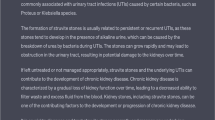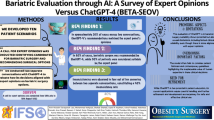Abstract
Purpose
ChatGPT is an artificial intelligence (AI) program with natural language processing. We analyzed ChatGPT’s knowledge about urolithiasis whether it can be used to inform patients about urolithiasis.
Methods
Frequently asked questions (FAQs) about urolithiasis on the websites of urological associations and hospitals were analyzed. Also, strong recommendation-level information was gathered from the urolithiasis section of the European Association of Urology (EAU) 2022 Guidelines. All questions were asked in order in ChatGPT August 3rd version. All answers were evaluated separately by two specialist urologists and scored between 1 and 4, where 1: completely correct, 2: correct but inadequate, 3: a mix of correct and misleading information, and 4: completely incorrect.
Results
Of the FAQs, 94.6% were answered completely correctly. No question was answered completely incorrectly. All questions about general, diagnosis, and ureteral stones were graded as 1. Of the 60 questions prepared according to the EAU guideline recommendations, 50 (83.3%) were evaluated as grade 1, and 8 (13.3%) and 2 (3.3%) as grade 3. All questions related to general, diagnostic, renal calculi, ureteral calculi, and metabolic evaluation received the same answer the second time they were asked.
Conclusion
Our findings demonstrated that ChatGPT accurately and satisfactorily answered more than 95% of the questions about urolithiasis. We conclude that applying ChatGPT in urology clinics under the supervision of urologists can help patients and their families to have better understanding on urolithiasis diagnosis and treatment.


Similar content being viewed by others
Data availability
Data available on request from the authors.
References
Liu Y, Chen Y, Liao B, Luo D, Wang K, Li H, Zeng G (2018) Epidemiology of urolithiasis in Asia. Asian J Urol 5(4):205–214
Strohmaier WL (2016) Recent advances in understanding and managing urolithiasis. Res 5:2651
Çinar Ç, Yildirim MA, Öneş K, Gökşenoğlu G (2021) Effect of robotic-assisted gait training on functional status, walking and quality of life in complete spinal cord injury. Int J Rehabil Res 44(3):262–268
openai. ChatGPT: Optimizing Language Models for Dialogue. In; 2023
Gilson A, Safranek CW, Huang T et al (2023) How does ChatGPT perform on the united states medical licensing examination? the ımplications of large language models for medical education and knowledge assessment. JMIR Med Educ. 9:e45312. https://doi.org/10.2196/45312
Rao A, Kim J, Kamineni M, Pang M, Lie W, Succi MD (2023) Evaluating ChatGPT as an adjunct for radiologic decision-making. MedRxiv. 16:1351
Yeo YH, Samaan JS, Ng WH et al (2023) Assessing the performance of ChatGPT in answering questions regarding cirrhosis and hepatocellular carcinoma. Clin Mol Hepatol. https://doi.org/10.3350/cmh.2023.0089
EAU Guidelines. Edn. presented at the EAU Annual Congress Milan 2023. ISBN 978–94–92671–19–6.
Lee P, Bubeck S, Petro J (2023) Benefits, limits, and risks of GPT-4 as an AI chatbot for medicine. N Engl J Med 388(13):1233–1239. https://doi.org/10.1056/NEJMsr2214184
Ergul A (2021) Quality and reliability of youtube videos on surgical treatment of uterine leiomyomas. Cureus 13(11):e20044
Alsyouf M, Stokes P, Hur D, Amasyali A, Ruckle H, Hu B (2019) “Fake News” in urology: evaluating the accuracy of articles shared on social media in genitourinary malignancies. BJU Int 124(4):701–706
Van Bulck L, Moons P (2023) Response to the letter to the editor on: Dr ChatGPT in cardiovascular nursing: a deeper dive into trustworthiness value and potential risks. Eur J Cardiovasc Nurs. https://doi.org/10.1093/eurjcn/zvad049
Meo SA, Al-Masri AA, Alotaibi M, Meo MZS, Meo MOS (2023) ChatGPT knowledge evaluation in basic and clinical medical sciences: multiple choice question examination-based performance. Healthcare (Basel) 11(14):2046
Antaki F, Touma S, Milad D, El-Khoury J, Duval R (2023) Evaluating the performance of ChatGPT in ophthalmology: an analysis of its successes and shortcomings. Ophthalmol Sci 3(4):100324
Author information
Authors and Affiliations
Contributions
All authors contributed to the study conception and design. Material preparation, data collection, and analysis were performed by HC, AA, and UC. The first draft of the manuscript was written by HC and all authors commented on previous versions of the manuscript. Conceptualization: AM; methodology: AM; formal analysis and investigation: OY; writing—original draft preparation: UC; writing—review and editing: AA; supervision: FO. The authors have no conflicts of interest to declare. All co-authors have seen and agree with the contents of the manuscript and there is no financial interest to report. The authors did not receive support from any organization for the submitted work. We certify that the submission is original work and is not under review at any other publication.
Corresponding author
Ethics declarations
Conflict of interest
The authors have no conflict of interest to declare. All co-authors have seen and agree with the contents of the manuscript and there is no financial interest to report. We certify that the submission is original work and is not under review at any other publication.
Additional information
Publisher's Note
Springer Nature remains neutral with regard to jurisdictional claims in published maps and institutional affiliations.
Supplementary Information
Below is the link to the electronic supplementary material.
Rights and permissions
Springer Nature or its licensor (e.g. a society or other partner) holds exclusive rights to this article under a publishing agreement with the author(s) or other rightsholder(s); author self-archiving of the accepted manuscript version of this article is solely governed by the terms of such publishing agreement and applicable law.
About this article
Cite this article
Cakir, H., Caglar, U., Yildiz, O. et al. Evaluating the performance of ChatGPT in answering questions related to urolithiasis. Int Urol Nephrol 56, 17–21 (2024). https://doi.org/10.1007/s11255-023-03773-0
Received:
Accepted:
Published:
Issue Date:
DOI: https://doi.org/10.1007/s11255-023-03773-0




